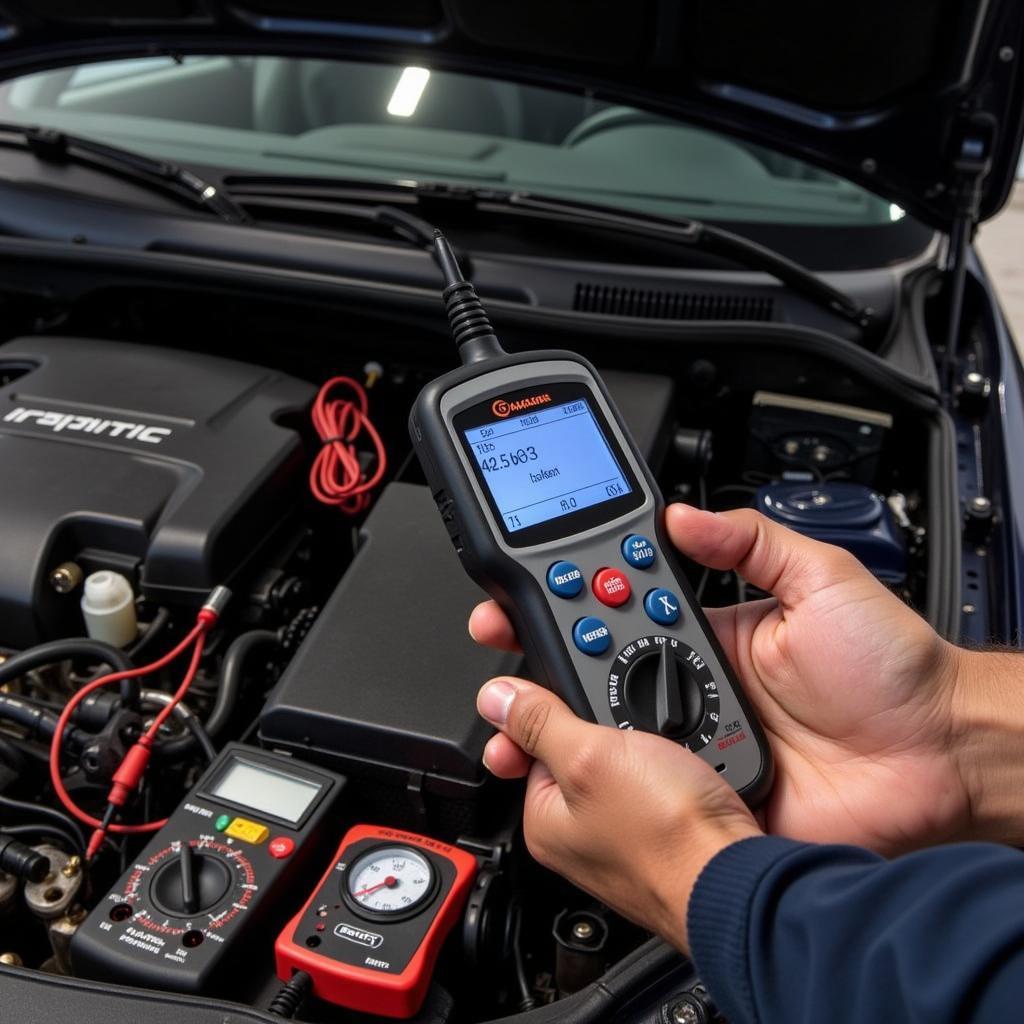Knowing who does diagnostics on cars is crucial when your vehicle starts throwing tantrums. This guide dives deep into the world of car diagnostics, revealing the different types of professionals, their expertise, and how to choose the best fit for your needs.
Decoding the Diagnostic Dilemma: Why It Matters
Car diagnostics involve using advanced tools and software to pinpoint the root cause of a vehicle’s issues. Gone are the days of mechanics relying solely on intuition and experience. Modern cars are complex machines with intricate electronic systems. Identifying the problem accurately, without guessing, requires sophisticated diagnostic equipment and knowledge.
 Car Diagnostic Tools
Car Diagnostic Tools
Who Does Diagnostics on Cars? The Usual Suspects:
- Dealerships: Authorized dealerships employ factory-trained technicians specialized in their brand of vehicles. They have access to proprietary diagnostic software and tools, making them a suitable option, but often at a premium price.
- Independent Mechanics: These skilled individuals often possess broad automotive knowledge across various makes and models. They might not always have the brand-specific tools dealerships use, but their experience and access to aftermarket diagnostic equipment make them a valuable resource.
- Mobile Mechanics: Bringing the diagnostics to you, these professionals offer convenience and flexibility. They typically handle routine maintenance and diagnostics. However, complex repairs might necessitate a visit to a fully equipped workshop.
- DIY Enthusiasts: For the technically inclined, the rise of affordable OBD-II scanners and DIY-friendly software has empowered car owners to perform basic diagnostics themselves. However, remember that in-depth knowledge and experience are crucial for accurate interpretation and repair.
Choosing the Right Diagnostic Expert: Factors to Consider
- Vehicle Age & Make: Newer vehicles often require specialized software and tools that dealerships and larger workshops are more likely to possess.
- Complexity of the Issue: For simple issues like a check engine light, independent mechanics or even DIY options might suffice. However, intricate electronic problems often demand the expertise of dealerships or specialized technicians.
- Budget: Dealerships often come with higher labor costs compared to independent mechanics or mobile services. Consider your budget and the potential cost of repairs when choosing.
- Location & Convenience: Evaluate the proximity and accessibility of each option. Mobile mechanics offer convenience, while dealerships might require scheduling and travel time.
[who does diagnostics on cars for free]
Beyond the Basics: Specialized Diagnostic Services
- Electrical System Diagnostics: Focusing on the intricate network of wiring, sensors, and modules that control various vehicle functions.
- Engine & Transmission Diagnostics: Specializing in diagnosing issues related to the engine, transmission, and related components.
- Brake System Diagnostics: Concentrating on identifying problems with brake components, including ABS and electronic stability control systems.
[how do i run a car diagnostic on my laptop]
Navigating the Diagnostic Landscape: Tips for Success
- Ask for Recommendations: Seek recommendations from friends, family, or online communities for reputable mechanics or dealerships.
- Check Credentials & Reviews: Verify the mechanic’s certifications and look for online reviews to gauge their expertise and customer satisfaction.
- Get a Written Estimate: Before authorizing any work, request a detailed written estimate outlining the diagnostic process, potential repairs, and associated costs.
- Understand the Diagnosis: Don’t hesitate to ask questions and ensure you clearly understand the diagnosis and recommended repairs.
- Consider Long-Term Costs: While opting for the cheapest option might be tempting, prioritize long-term value. A thorough diagnosis and quality repair can save you time and money in the long run.
[how long does car ac diagnostic take]
Conclusion
Knowing who does diagnostics on cars empowers you to make informed decisions regarding your vehicle’s health. By understanding the different types of professionals and considering factors like vehicle age, issue complexity, and budget, you can navigate the diagnostic process with confidence, ensuring your car receives the best possible care. Remember, a well-maintained vehicle is a happy vehicle.
FAQ
Q: Can I diagnose car problems myself?
A: Yes, basic diagnostics can be performed using affordable OBD-II scanners and DIY software. However, complex issues often require professional expertise.
Q: How often should I get car diagnostics done?
A: It’s recommended to have your car’s systems checked at least once a year or as part of your regular maintenance schedule.
Q: What if I disagree with a mechanic’s diagnosis?
A: Don’t hesitate to seek a second opinion from another reputable mechanic or dealership if you have doubts about the diagnosis.
Q: Can I negotiate the cost of car diagnostics?
A: While prices are generally standard, it’s always worth inquiring about potential discounts or negotiating a fair price, especially for extensive diagnostic procedures.
[who does free diagnostics for cars]
Have more questions about car diagnostics?
Check out these related articles:
Need further assistance? Contact our team of car diagnostic experts 24/7 via WhatsApp: +1(641)206-8880, Email: [email protected]. We’re here to help!

Leave a Reply